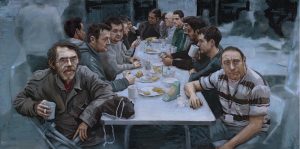Moira writes: This morning as you prepare for worship you might like to read through our gospel passage, John 14.1-14. This passage is often used at funeral services and can bring comfort to those who are mourning. However, this passage has something to say to us all – here and now. It speaks to the circumstances that trouble our hearts today.
In today’s world, it’s really difficult to listen to these words of Jesus and not be troubled. So many troubling things are happening around us, both in our lives and in the world! Jesus himself was ‘troubled’ when he saw Mary and ‘the Jews who were with her’ weeping over the death of Lazarus. And in John 12.27 Jesus says, “Now my soul is troubled. And what should I say—’Father, save me from this hour’? No, it is for this reason that I have come to this hour.”
“Do not let your hearts be troubled.” These words were spoken on the night that Jesus shared the last supper with his disciples. He had announced his departure from this world, his death! He had washed the feet of his disciples, Judas had left the table to step into the night-time of betrayal, and Peter would soon break his silence with a threefold denial.

‘Our Last Supper’ by Iain Campbell featuring guests of Glasgow City Mission(2016)
“Do not let your hearts be troubled,” Jesus says. Jesus recognizes that our hearts are troubled. He isn’t warning us about things that will happen in the future, he knows that our troubles and the troubles of the world have already begun. He can see it in us because he’s experienced it within himself. He also knows that our lives and the world are not defined by or limited to what troubles us.
What if not letting our hearts be troubled begins with looking into our own hearts and seeing and naming what those troubles are? Facing up to our worries, things happening in our lives and in our world. It looks like this is the first and most difficult thing Jesus is asking of us in today’s gospel.
I don’t know about you but sometimes it’s easier not to think or to look at what is happening around us. We don’t want to name the things that trouble us because it’s too difficult and too painful, because it forces us to face up to the reality that not everything is working well in present day society and we might wonder where it’s all going and where it will end. We only have to look at the troubles in our National Health Service, the unrest in all areas of the workplace with strikes and protests, not to mention the wars and conflicts happening in many places around the world. And closer to home, the worries and troubles of those who struggle to get by each day because of rising prices and inflation. It’s troubling and we worry where it’s going and how we can get through it.
Thomas speaks for us all when he says, “Lord, we do not know where you are going. How can we know the way?”. It’s as if we have lost our centre and we don’t know how to re-centre or re-align our troubled hearts and minds. Where do we go when it looks like everything is collapsing around us? So often we need reminding that at the centre of our hearts and minds is God.
When our hearts are troubled, that’s the time we need to re-centre our thoughts and to remember that it’s all part of the great tapestry of life. We can’t expect to go through life completely free from worries, but if we have our faith in God to rely on, then we can, with God’s help, re-centre our hearts and minds.
Phillip says to Jesus, “Lord show us the Father and we will be satisfied.” Phillip doesn’t yet realise that ‘the Father’ is within him, at the centre of his being. God is with him, as he is with us, in the here and now. Our Father’s house is within us, the Kingdom of God is within us. Wherever we go and whatever we face in our lives, God is there with us, he is there in the centre, at the core of everything we do. In the language of today’s gospel, the centre is the Father’s house and there are many dwelling places in this house. In the Father’s house there is a dwelling place for everyone who is troubled. When I say this, I’m not talking about the after-life, and I’m not thinking of this as some sort of celestial place for those who are true believers. I’m taking about the dwelling places as the way that God’s life intersects with our own: in mercy and forgiveness, in justice, generosity, compassion and healing, in love, beauty, wisdom and hope, and in courage, joy and relationship. These are the dwelling places for troubled hearts, the places of re-centering.
A few weeks ago Nerys had a labyrinth in the church hall and we were invited to walk the labyrinth, stopping at places on the way to pray and to re-connect with God. These are places of re-centering and re-focussing on our journey with God. I’m not sure how many of you were able to do this, but if you didn’t manage to walk the labyrinth then, maybe you could think about doing it when the labyrinth in the rectory garden is renewed or use the design here as a finger labyrinth.

Our gospel passage today, I think, is challenging us to think about what is really troubling our hearts today and to remember that God is at the centre of our lives, reminding us that we are not alone. When we find that centre and find balance and harmony in our lives, perhaps we might see and respond to our troubles and the troubles of the world differently.
In your prayers this morning please remember those who are ill or in need of prayer.
Pray for peace in our world, especially in Sudan, Ukraine, Palestine and Israel.
Pray for those who struggle with their faith or have turned away, that God would draw them into his fold.
Give thanks to God for all the good things happening in this community and in our lives.
May God bless you this week and keep you centred in his love.






